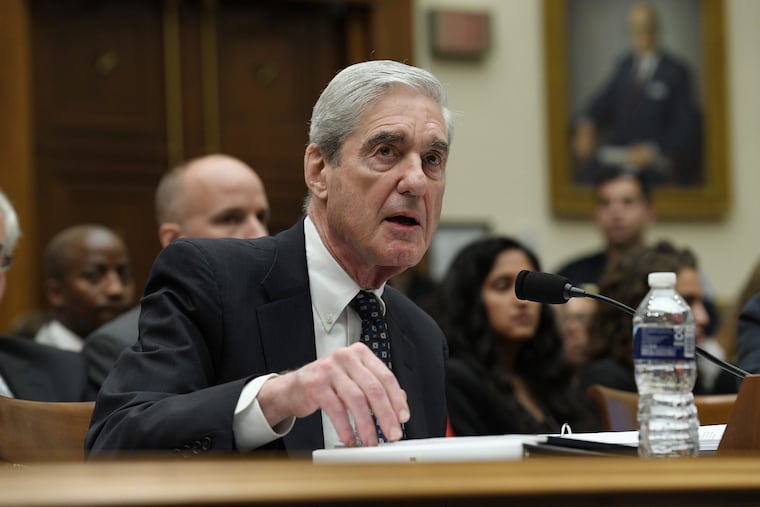How Robert Mueller failed America | Will Bunch Newsletter
Trump-Russia bombshells raise a question: What on earth was Mueller doing?

The week before Labor Day is always a weird time. I mean, it’s still summer, right? So why is the morning suddenly nippy, the night suddenly longer, the sense of something ending so tangible? The good news is that the season of The Will Bunch Newsletter has only just begun. Did someone forward you this email? Sign up to receive the newsletter weekly at inquirer.com/bunch, and store some of them up for winter.
Trump-Russia bombshells raise a question: What on earth was Mueller doing?
Robert Mueller turned out to be an American hero for the Trump era — and by that I mean he was supposed to save all of us yet somehow failed miserably. Looking back on those halcyon days of 2018, it’s easy to understand Mueller mania. He’s a tall and distinguished Vietnam War hero and former FBI chief with a long track record of integrity who, as special counsel investigating Russia’s 2016 election interference and any Team Trump links to it, nabbed the low-hanging fruit and seemed to be moving on the president’s inner circle.
And then it all ground to a bizarre halt. To Trump and his allies, Mueller’s failure in early 2019 to recommend the president’s impeachment and finding of no proactive Trump conspiracy to entice Russian meddling was proof that “this whole Trump-’Russher' thing” was a hoax. Instead, recent revelations have shown that Vladimir Putin’s interference, and Team Trump’s welcoming of it, was worse than anyone thought. The disclosures also raise a giant question: What the hell was Mueller doing all that time?
The bombshells started dropping on August 18 with the long-awaited report on Russia and the 2016 election from the Senate Intelligence Committee — a bipartisan effort where Republicans were actually in the majority. After nearly four years of GOPers on Capitol Hill covering for the president, this one flipped the script — going well beyond the 2019 Mueller report in documenting contacts between the Trump campaign and Russia or Wikileaks, the intermediary that dumped Democratic emails stolen by Putin’s men. Team Trump, they discovered, was eager to exploit any Moscow connection and then desperate to cover it up.
For example, the senators went much deeper than the special counsel in documenting ties between Trump’s campaign manager for a big chunk of 2016, the now-disgraced felon Paul Manafort, and a man the Senate committee pegged as a current, active member of Russian intelligence, Konstantin Kilimnik. Even more damning, the report assessed that the president lied in his written statement to Mueller about whether he’d discussed Wikileaks with his longtime political adviser, also now a felon, Roger Stone.
Had Mueller’s punch-pulling report — released only after a wildly successful effort by Attorney General William Barr to both suppress it and misrepresent it — been as forceful as the Senate’s findings, it’s likely the president would have been impeached for obstructing justice and his claim that the Russia matter is “a hoax” might have been neutralized. So why did Mueller, so admired for his character, ultimately let the nation down?
We got a glimpse into what really happened this week with the publication of a new book by the New York Times reporter Michael S. Schmidt. It charged that the Trump-appointed deputy attorney general tasked with overseeing the Mueller probe, Rod Rosenstein, took secret measures early in the investigation to ensure federal agents wouldn’t look into the role of Trump’s personal financial ties to Russia. According to Schmidt, Rosenstein ordered Mueller not to look at the president’s finances but never told the FBI, which had major counterintelligence concerns.
While we associate the Trump administration with incompetence — 183,000 coronavirus deaths will do that — the truth is that Rosenstein and later Barr led a brutally efficient and successful cover-up of the Trump-Russia ties.
Robert Mueller may have led an exemplary life, but he was the wrong man for this job. Watching his shaky congressional testimony in the summer of 2019, viewers couldn’t help but feel that his sense of duty, his respect for command and maybe the exhaustion of a man in his mid-70s were cynically exploited by Trump’s minions. It matters because the beat-down of Mueller’s report on 2016 only set the stage for more Russian interference in 2020.
Just this weekend, we learned that Trump’s super-loyalist new director of national intelligence, John Ratcliffe, has told Congress he’s doing away with in-person briefings of congressional leaders about 2020 election meddling, infuriating Democrats. The president — who hates for people to know about Putin’s efforts to assist him — says he’s worried about leaks, but we should all be worried about the threat to democracy and a fair election. We’re conditioned to think about Watergate as the greatest political cover-up in American history, but the Trump-Russia obstruction seems to have have surpassed it. It’s a crime that’s still in progress.